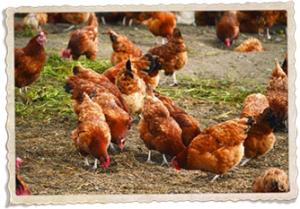The first signs of fall are typically falling leaves and colder temperatures. But if you’re a chicken owner, those signs will also be accompanied by your chickens molting. While this is a completely normal process that your chickens will go through each year, you may be wondering why it happens. Read on to learn more:
It depends on the type of molt
Chickens actually go through several molts during their lifetime. Their first molt will occur when they’re six to eight days old as they lose their downy covering for actual feathers. Then, at eight to twelve weeks old, they’ll lose their “baby feathers” and replace them with a second set of “adult feathers,” similar to how we humans lose our baby teeth.
The molting you see during the fall or late summer each year is triggered by the decrease in daylight hours and the end of an egg-laying cycle. It’s simply a way to shed old feathers and grow new ones. Just as we lose hair and then grow more, and other animals shed fur and then grow more, chickens will shed feathers and then grow more.
Hard molt vs. soft molt
When a chicken molts, you may see two different methods of molting. A soft molt is when they lose their feathers and it’s not entirely noticeable to the untrained eye. A hard molt, on the other hand, will lose their feathers suddenly and almost appear nude. Many first-time owners panic seeing their chickens hard molt because they believe their ill. However, while your chickens may not be very pretty during this time, they will grow new feathers—it’s nothing to be concerned over!
Regular molting vs. illness
In most cases, molting is nothing to worry about. But sometimes it is a sign that your chicken is ill. If you notice your chicken losing feathers after the normal molting period in late summer and early fall, then it could be due to an illness. You should also keep an eye out for other symptoms that could mean your chickens aren’t feeling well.
Chicken molting is a completely normal process, but if you ever have any concern, don’t hesitate to contact your veterinarian. For more tips on how to care for your chickens, read through our blog or contact Chickens for Backyards today.

